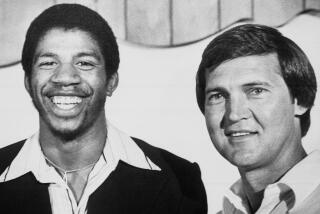COMMENTARY : Spotlight Was Too Much for Jordan
- Share via
I would never do you guys’ job because you don’t have sympathy for normal people, sometimes.” --Michael Jordan, Oct. 6, 1993
This is about Michael Jordan, the man and the performer.
The performer was divine. The man was all too human.
He yearned to be “normal.” He was a small-town guy from Wilmington, N.C., who wanted only to be good at his job, to achieve financial security, to have the peace to enjoy it.
Unfortunately, he became a player transcendent. He sold $35 million worth of his likeness annually to corporations who displayed it all over the airwaves, multiplying his fame.
People used to say that only Muhammad Ali’s fame could rival Mike’s. Maybe no sports figure could, or no actor, or anyone.
When Ali did not step forward in Houston that day and refused induction into the armed services, no network cut away for the event. When Magic Johnson announced his shocking retirement two years ago, people watched all over the world off a feed from a single cable network, ESPN.
Jordan’s retirement Wednesday was carried by two of the three over-the-air networks, plus ESPN, ESPN2 and CNN. CNN cut from Jordan in Deerfield, Ill., to Boris Yeltsin in Moscow, making his first speech since putting down the revolt in Russia.
Jordan never ceased to marvel at this colossus he had become. He never understood what he had done to make it happen--namely, to sell himself to all comers by promoting a homespun image of himself--and he never understood that the greater the fame, the greater the scrutiny.
Jordan had a love/hate thing with the spotlight. He loved to perform, but he didn’t want that “ambassador for the game” tag the No. 1 superstar was supposed to carry. Wednesday in Deerfield, Jordan repeated again that he didn’t want it, nor had Magic Johnson or Larry Bird, but Jordan was wrong. Johnson gloried in the role, promising always to pass the torch to Jordan one day. Jordan left it lying there.
Jordan told confidants early in his career that he feared one day the press would try to expose him and take all he had built up. But in the last three years, as his fame peaked, he seemed almost to defy the world to take note of the gap between his image and his reality.
If he was a genuinely nice guy, he was not the boy next door. He was a competition junkie who would take writers and TV guys on all-night jaunts to Atlantic City and have them over at his all-night poker games in Chicago. If the press guys were part of the conspiracy, they couldn’t give him away, right?
For years no one did. Maybe that was what emboldened Jordan to cast caution to the winds in the last three years.
He spurned the team’s trip to the White House. He lost more than $100,000 in golf bets to assorted felons and shady characters from North Carolina. He was alleged to have lost $1.2 million to a man from San Diego.
The press was obliged to follow where Jordan led.
Sometimes it went overboard, as when the New York Times quoted two anonymous sources who said Jordan had been at Bally’s Grand until 2:30 a.m. the day of Game 2 of the 1993 Eastern Conference final, prompting Jordan’s boycott. Jordan denied it and no named source ever stepped up to corroborate the newspaper’s account.
This prompted Jordan to boycott the press but was followed by the publication of the Richard Esquinas book that raised far more disturbing questions about Jordan’s gambling on one hand and further infuriated Jordan on the other.
An entire press corps that wanted only to cover a basketball tournament was converted into paparazzi.
NBA officials implored Jordan to end his silence for the finals, but Mike took his time about it, telling his story first to longtime confidant Ahmad Rashad of NBC.
The day after Game 1 in Phoenix, he walked onto the practice court in America West Arena with his teammates, into the middle of several hundred reporters who were just finishing up with the Sun players.
Did his presence mean he would talk?
Jordan was immediately ringed by writers and mini-cam crews. He said nothing, smiled, broke through the circle and walked away.
The mob formed again around him. He walked away again.
It happened all over. Finally an NBA official ordered reporters off the floor.
No one who likes the game can feel anything but sadness at Jordan’s retirement. It’s like the Beatles breaking up. The same writers who followed his recent misadventures faithfully will spend years telling everyone that once they covered Michael Jordan.
It’s a shame it ended badly, but that’s life in the biggest city of all, which was what Michael Jordan had become.
More to Read
Go beyond the scoreboard
Get the latest on L.A.'s teams in the daily Sports Report newsletter.
You may occasionally receive promotional content from the Los Angeles Times.










